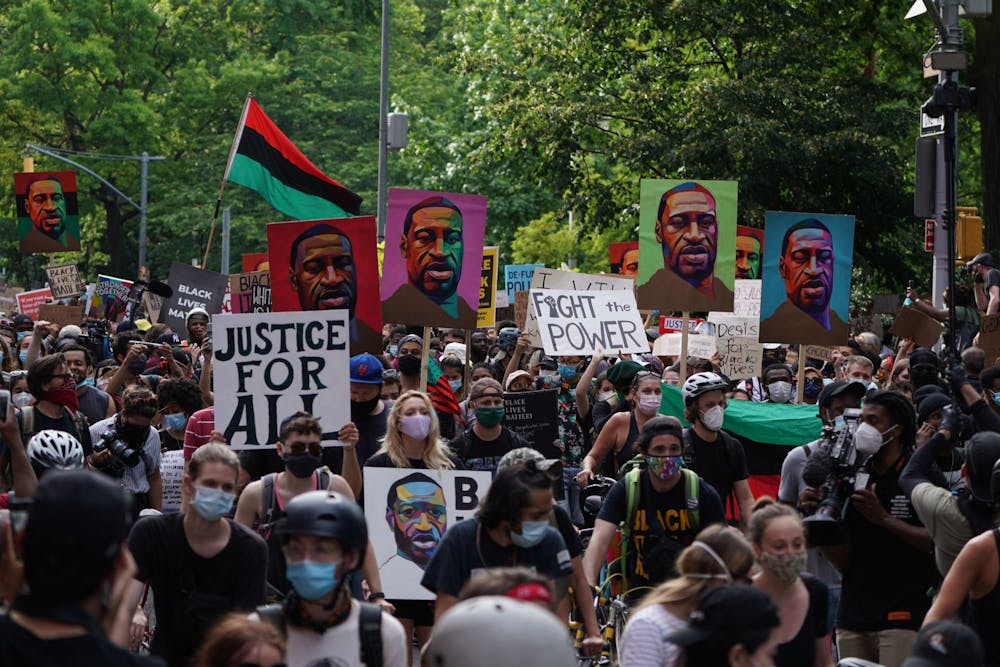This isn’t anything special.
It seems like there's no end to the craziness that's been going on in Trump's term. There's a pandemic that seems to be worse in the U.S., with the number of deaths rising 250,000. There's been a steady and ongoing pattern of civil unrest throughout the country in response to the many killings of Black folk at the hands of the police. The sitting president, seemingly uninterested in those issues, is mired in political and personal scandals regarding a second impeachment sparked by an insurrection he inspired at the U.S.Capitol. These are interesting times, sure, but it's nothing new.
We've been here before.
President Trump isn't the first celebrity-turned-Republican-president to mishandle a deadly virus. I may not be old enough to have lived through the peak of the AIDS crisis, but the aftershock still resonates in how I get to operate in this country as a gay man. For decades, AIDS rampaged through Black and LGBT communities, ignored by the administration run by President Ronald Reagan. hundreds of thousands died from AIDS under his presidency.
Regan didn't mention or address AIDS until 1987, well into the peak of the crisis. His lax response to AIDS mirrors much of President Trump's response to COVID-19. Both downplayed the severity of the virus and the number of deaths.
In both cases, the virus in question had a disproportionate impact on marginalized communities and was widely ignored by the commander-in-chief. LGBTQ+ people were demonized in the media, with targeted policies that are still in effect to this day. Gay men still have restrictions placed on donating blood because of how poorly Reagan mismanaged the AIDS crisis.
Some of those restrictions on gay men donating blood have been lifted or eased, but for the most part, both presidents have told me they'd rather take my life than my blood.
The Trump administration was also slow to respond to the many people killed by police during his term. Between the pandemic and the civil unrest, the summer felt like it would never end, but the series of riots aren't unprecedented nor is it surprising. I can't name a span of five years where there wasn't a protest led by Black people fighting for justice. We've been here before.
We've seen riots and unrest as recent as 2015 in Baltimore, in response to the death of a Black man named Freddy Gray, while in police custody. Before that was the uprising in Ferguson, another riot in response to the death of another Black man, Michael Brown. There was also the LA uprising in 1992, in response to the filmed beating of Rodney King by the hands of the police.
What's known as the long, hot summer of 1967 was a series of simultaneous riots, just as numerous as what happened in 2020. And the response to those riots was similar — an increase in police brutality.
Before the long, hot summer was the Red Summer of 1919, a brutal series of race riots resulting in the deaths of hundreds. The civil unrest in 2020 is just the latest in a long line of unrest – a continuation of the strife Black folk have lived with since the inception of America.
As disheartening as it is, we've been here before.
Even the insurrection on the Capitol is something that's happened before. Sources show the mob that took over the U.S. Capitol Jan. 6 were largely white supporters of Donald Trump, contesting the results of the election. Along with them were members of various different white supremacist groups, such as the Proud Boys and the Nationalist Social Club. The mob tried to kill representatives. Upset at their loss in the 2020 presidential election, they took over a place that wasn't theirs, attempting to burn it down and make it theirs.
When I first heard of the Capitol being stormed, I thought about the Tulsa Massacre of 1921, where a whole community of people were razed to ashes. Also known as "Black Wall Street," a community of successful Black businesses in Tulsa, Oklahoma, were burned down, rendering multiple homes and businesses to nothing. After years of tension, a mob decided to attempt to kill one of the Black people in Black Wall Street. The wealth of the Black folk that lived there was wiped out. Hundreds lost their lives because they wanted to prevent one of their own being lynched.
The storming of the Capitol was similar. A mob was denied an opportunity to be unfair — to overturn a fair election. The Tulsa massacre was in response to being denied a similar opportunity, to be above the law and lynch a Black person.
The reason I keep insisting we've been here before is because to act as if we haven't is to ignore history.
With how often the word "unprecedented" gets thrown around in headlines, we'd think there's no way to foresee what's been going on around us. No, this isn't new. All throughout American history, we've seen how often those in power got it wrong, how presidents and systems didn't truly protect everyone's rights and how often violence was the response for pointing that out.
To insist these are unique times to live in gives the current administration an excuse, to say America has never had to deal with something of this magnitude. This is American history — of riots, of unrest, of administrations that ignore the violence against their marginalized peoples, of unequal treatment. We've been here before. We're going to be here again.






